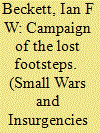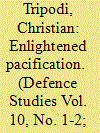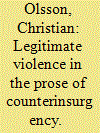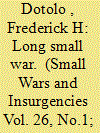|
|
|
Sort Order |
|
|
|
Items / Page
|
|
|
|
|
|
|
| Srl | Item |
| 1 |
ID:
168215


|
|
|
|
|
| Summary/Abstract |
What Rudyard Kipling called the ‘campaign of lost footsteps’ was the longest campaign fought by the Victorian army. The conquest of Upper Burma, an area of 140,000 sq. miles with a population of four million, took only three weeks in November 1885 and was accomplished with minimum cost. However, the removal and deportation of the Burmese King and dismantling of all traditional authority dismantled led to growing resistance to British rule leading to an increasingly difficult guerrilla war. Though the Burmese guerrillas were characterised by the British as mere bandits or dacoits, many were former soldiers along with Buddhist monks. The extremely difficult nature of campaigning in the terrain and climate of Burma was not sufficiently appreciated by the War Office, who viewed the conflict as a ‘subaltern’s war’ and ‘police’ work. Intended regime change was also not accompanied by any consideration of the likely implications. Prolonged insurgency necessitated deploying a force far larger than originally intended; though order was finally secured by 1895, the campaign proved destructive of Burmese society while British recruitment of hill tribes into the police and armed forces sowed the seeds for future divisions.
|
|
|
|
|
|
|
|
|
|
|
|
|
|
|
|
| 2 |
ID:
165185


|
|
|
|
|
| Summary/Abstract |
Insurgencies remain political projects, and thus the American experience in Vietnam remains relevant in any search for approaches. A population-first strategy – with tactics compatible with protecting people and winning their willing support – is essential, as much for success in local pacification as in retaining support in the homeland which has deployed its personnel abroad to assist another state. In the actual area of operations, decentralization of effort is required to get as close as possible to the population base being targeted by the insurgents. This remains essential for all mobilization in support of a polity, regardless of the extent to which insurgent challenge is grounded in grievances or simply based on coercive power.
|
|
|
|
|
|
|
|
|
|
|
|
|
|
|
|
| 3 |
ID:
094746


|
|
|
|
|
| Publication |
2010.
|
| Summary/Abstract |
Counterinsurgency doctrine emerged in the early 1960s as the Kennedy administration sought a politically progressive alternative to "pacification" campaigns waged by the French against the Vietnamese revolution. But its architects could not come up with a substitute for the conventional military reliance on massive firepower, which brought devastation to the Vietnamese people and failed to crush the "Viet Cong." The Americans were again unsuccessful in transferring legitimacy to their allies in Saigon. After the war, the notion of counterinsurgency was kept alive among military writers. Rechristened as "COIN," it has been given the task of providing cover for further "dirty wars" in Iraq and Afghanistan.
|
|
|
|
|
|
|
|
|
|
|
|
|
|
|
|
| 4 |
ID:
096508


|
|
|
| 5 |
ID:
185077


|
|
|
|
|
| Summary/Abstract |
Within recent critical debates about the geographies and circulations of counterinsurgency knowledge, scholars have focused primarily on dominant centres of power and authority in the global North. Building a framework drawn from critical geography, this article decentres these locations and actors by exploring the global production and circulation of counterinsurgency knowledge from the vantage point of Indian strategic thinkers. Focusing on the work of the Indian think tank the Institute for Conflict Management (ICM), the article traces how Indian counterinsurgency knowledge has been produced, packaged and circulated transnationally since the late 1990s. It argues the power and utility that forms of counterinsurgency knowledge command – Indian or otherwise – are never reducible to the essential features of what actors or texts say. Rather, it suggests that counterinsurgency knowledge is produced through particular relations and locations of power-knowledge that define what they represent and where they fit in. It theorizes forms of counterinsurgency knowledge as positions within broader transnational forces, entwined with colonial histories of pacification. In doing so, it illuminates the contestations and forms of work involved in staging or organizing the world through practices that make some forms, actors, and locations important and relegate others to the peripheries of global politics.
|
|
|
|
|
|
|
|
|
|
|
|
|
|
|
|
| 6 |
ID:
193039


|
|
|
|
|
| Summary/Abstract |
This article analyses the incorporation of social dialogue in industrial relations and its role in pacifying public sector unions in Zambia. A sample of 19 managers of public institutions and union leaders in Lusaka participated in the research. The research reveals that social dialogue is used to pacify trade unions as governments implement structural adjustment policies, which bring about poor employment conditions. Although the unions have responded to pacification by diversifying and servicing their membership, they are still weak. This finding is significant because it helps us to understand why unions in Southern Africa are weak in the post-independence era.
|
|
|
|
|
|
|
|
|
|
|
|
|
|
|
|
| 7 |
ID:
121200


|
|
|
|
|
| Publication |
2013.
|
| Summary/Abstract |
Drawing on a critical engagement with the claims made by (and interpretations of) the 2006 US army and marine corps field manual on "Counterinsurgency," this article engages some of its underlying concerns with the problematic relation between violence, legitimacy, and political order. Since this manual draws heavily on many commonplaces of contemporary political science, the analysis explores their problematic presuppositions and the ways in which they play out in contemporary warfare. The primary conclusion is that while the encounter of legitimacy and violence is claimed by the doctrine to produce and maintain political order, its framing of this encounter is deeply rooted in a specific political order, that of the modern state, which severely constrains the conditions under which this encounter can take place. These constraints cast serious doubts on many of the doctrine's assertions, especially as they have shaped recent wars in Afghanistan and, until recently, in Iraq.
|
|
|
|
|
|
|
|
|
|
|
|
|
|
|
|
| 8 |
ID:
139102


|
|
|
|
|
| Summary/Abstract |
The paper argues that the success of the Italian pacification campaign of Libya in 1932 can be traced to the implementation of a military-centric strategy used in counterrevolutionary warfare, a type of Small War made popular in the early twentieth century and an older form of counterinsurgency. Rather than focus on achieving an acceptable level of security common to modern counterinsurgency doctrine, COIN, the Italians used kinetic military operations to defeat and subdue rebel groups in the two Libyan colonies of Tripolitania and Cyrenaica. The roots of third rebellion, and the military strategy used to pacify the colonies, were developed during the guerrilla war by Ottoman and indigenous groups used to oppose the Italian invasion of Libya during the Italo-Libyan War, 1911–1912. The lessons of Italy's success should make the application of a military-centric rather than a security-centric strategy useful for current counterinsurgencies.
|
|
|
|
|
|
|
|
|
|
|
|
|
|
|
|
| 9 |
ID:
185073


|
|
|
|
|
| Summary/Abstract |
This paper reveals the secrets of BlueLeaks, a massive archive of documents hacked from police agencies, and intelligence centers in the United States. A September 2019 Intelligence Assessment by the Virginia Fusion Center cites counterinsurgency expert David Kilcullen to evaluate the ‘insurgency tactics and strategies’ of environmentalists. What is remarkable about the document is not the domestic application of counterinsurgency but how it reveals the biases of security. Read from an anti-security perspective, this document becomes a cipher to decode the political content of the BlueLeaks archive that is obscured by the deep acceptance of ‘security’ as an apolitical, unqualified social good. The analysis is grounded in document and network analysis of BlueLeaks documents from the New England region. It finds that practices commonly understood as ‘counterinsurgency’ span and animate the continuum of pacification. The secret of BlueLeaks is the secret of security: a ceaseless low-intensity class war that envelops and encompasses the continuum of pacification, protects property, administers poverty, depoliticizes social harms, and elicits participation in pacification.
|
|
|
|
|
|
|
|
|
|
|
|
|
|
|
|
|
|
|
|
|